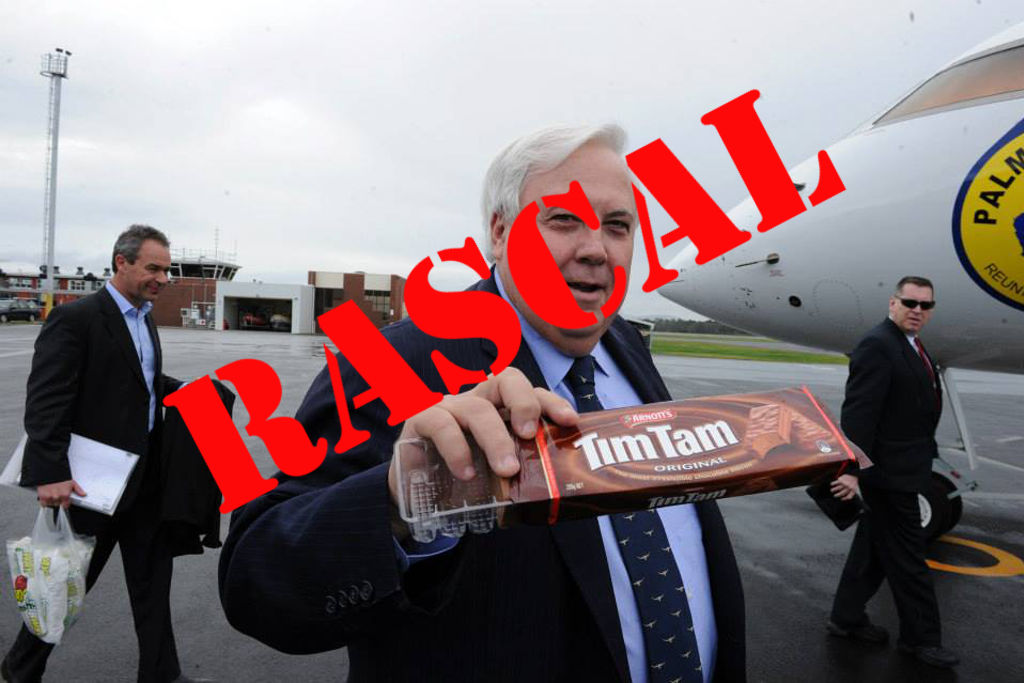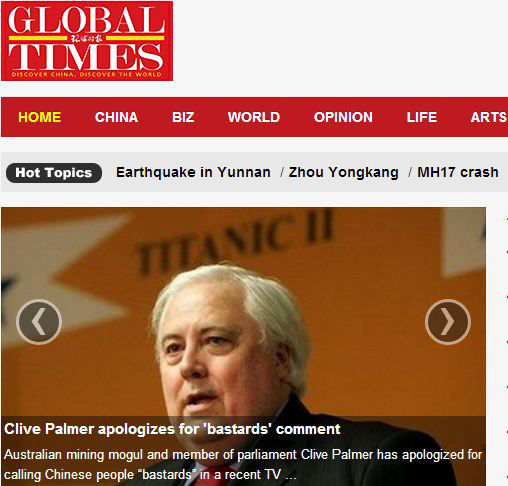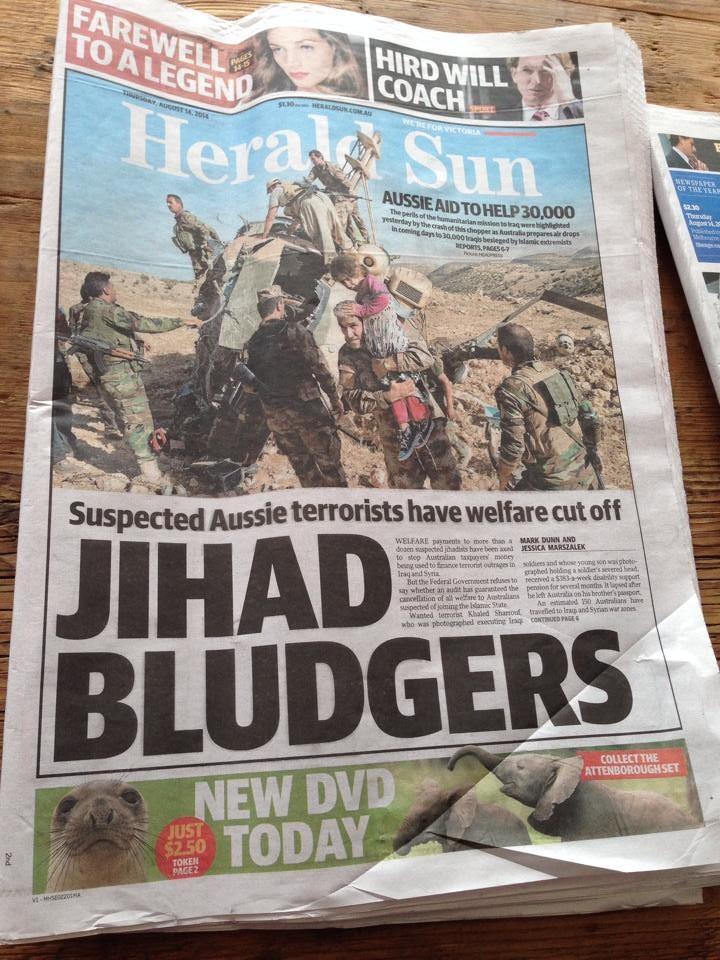According To China’s Angriest Newspaper, Clive Palmer Is A “Rascal” And So Are You
Why does China's Global Times use "rascal" like an insult?

Last week, when Clive Palmer took to Q&A to call the Chinese “bastards” and “mongrels”, Chinese tabloid newspaper Global Times hit back at him and his fellow “prancing provocateurs”, saying that “Palmer’s rampant rascality serves as a symbol that Australian society has an unfriendly attitude toward China”.
Palmer has since apologised, but the whole incident raised something pretty interesting, and more than a little weird; ‘rascal’ is the Global Times’ favourite insult. It’s already described Australia as a place once “roamed by rascals and outlaws from Europe” that “has to boast its values to cover up its actual lack of confidence in front of Western countries,” and we’re not the only country to get the ‘rascal’ treatment. After the United States dared to accuse China of hacking in May, the Global Times declared: “the US is such a mincing rascal that we must stop developing any illusions about it.” Hee-hee, mincing rascal!

Not even corporations are safe; in 2011 it branded oil and gas company ConocoPhillips “a civilised rascal”. Whatever that means, I love it. But what is this sassy newspaper, and why is it so tough on rascals?
–
The Global Times’ Sickest Chinese Burns
Founded in 1993, and with a circulation of 1.5 million copies daily (compared to the Herald Sun’s 394,597 and The Daily Telegraph’s 293,512), the state-owned Global Times is China’s third most popular newspaper: a racier alternative to stuffy Party organ People’s Daily.
It’s China’s answer to the Herald Sun or Daily Telegraph: a mix of lively crime, entertainment and weird news. Editor-in-chief Hu Xijin, a master’s graduate in Russian literature from Beijing Foreign Studies University, joined the People’s Daily in 1985 and worked as a war correspondent in the Balkans and the Middle East before joining the Global Times in 1996. He was made editor in 2005, and launched the English-language edition and website in 2009. Hu vets every story, and writes the provocative lead editorials himself, based on late-afternoon meetings with staff.

In 2010, Fairfax’s Ross Garnaut interviewed Hu, who explained that the Global Times “represents the true heart of the ordinary Chinese people”. When Garnaut suggested “that Chinese people did not seem remotely as aggressively paranoid as his newspaper”, Hu called him “naïve”, lacking in “education and experience” and said Garnaut was “not qualified as a journalist”. The Garnaut interview is amusing reading, because the numerous sick burns Hu unleashes on Garnaut clearly reflect the ‘Global Times voice’ as a trash-talking, semi-official mouthpiece of the regime with a legendary record of picking fights.
Last December, the paper was apoplectic when Japan’s Prime Minister Shinzo Abe visited the notorious Yasukuni Shrine, where convicted WWII war criminals are still honoured as heroes. “In the eyes of China, Abe, behaving like a political villain, is much like the terrorists and fascists on the commonly seen blacklists,” the Global Times editorialised, threatening “appropriate, even slightly excessive countermeasures”.
When Chinese Premier Li Keqiang visited the UK last month, the Global Mail called British reports that he had demanded to meet the Queen “unprofessional” and “narrow-minded”, claiming that “the once-powerful British Empire must now resort to such trickery to manifest its pride”, and magnanimously concluding that “a rising country should understand the embarrassment of an old declining empire and at times the eccentric acts it takes to hide such embarrassment”. Haha, burn!
To the Global Times, Australia similarly can’t be trusted; it’s a “radical double-dealer” that has “picked sides and embraced the US and Japan”. It’s best to treat rascals like Australia, Hu writes, as merely “a remote business partner, and a place where the Chinese can take a trip and learn some English”.
To domestic readers, these editorials paint an appealing picture of China’s international political clout. And when they’re quoted in the Anglophone media – like rumours whispered through a playground – it creates a flattering impression of the Chinese media’s international power and influence. But the Chinese-language versions – those playing to the home crowd – pull far fewer punches. For instance, an English-language editorial might say “Australia’s history has numerous instances of human rights violations against its Aboriginal population,” but the Chinese-language version refers to Australia’s “filthy record of violating the human rights of Aboriginals” and calls Foreign Minister Julie Bishop “a complete fool”.
–
But Why Does The Global Times Keep Calling Everyone Rascals?
The answer lies somewhere in the origins of the word itself. ‘Rascal’ entered the English language in the mid-14th century from the Old French rascaille, meaning a mob or rabble. It meant ‘people of the lowest class’, and by extension, a low, dishonest or tricky person.
Today, ‘rascal’ has connotations of naughty, mischievous children, and is synonymous with ‘scamp’, ‘rapscallion’ or ‘tyke’. That’s the sense in which the Global Times uses it in a story about a “rotund rascal” of a panda caught up a tree, or when recounting the young Vladimir Lenin’s “rascal-like antics”.
More broadly, though, Chinese popular culture is full of ‘rascal’ figures. There’s a rich folkloric tradition of tall tales and dirty jokes about Ming dynasty artist, playwright and probable bipolar suffer Xu Wei, which share similar trickster tropes with the misadventures of Monkey and Pigsy in Journey to the West.
In some news coverage, ‘rascal’ seems to connote generational change in China. The South China Morning Post writes: “Beijing artist Song Yonghong has been called a member of the ‘bored rascal’ school of painting”, and the China Digital Times refers to Han Han, a hip and influential author, blogger and CNN-appointed unofficial voice of his generation, as “China’s rascal literatus”.
But in the Global Times editorials, ‘rascal’ seems to be used synonymously with ‘recalcitrant’ or ‘rogue’ – someone dishonest and untrustworthy, who behaves in unpredictable, self-interested ways. Just as it’s interesting to observe the feral jingoism of Australia’s tabloid media, I enjoy the Global Times’ relentless nationalism and dissing of foreigners. Perhaps it uses ‘rascal’ as ideological shorthand for the enemies of Chinese nationalism, much as our tabloids invoke Aussie ‘battlers’ versus ‘bludgers’.

So as long as Australian politicians keep poking at the Chinese leadership with sticks, we can be pretty sure Australia will continue to be China’s nasty little rascal for a while yet.
–
Mel Campbell is a freelance journalist and cultural critic. She is the founding editor of online pop culture magazine The Enthusiast and author of the book Out of Shape: Debunking Myths about Fashion and Fit. She blogs on style, history and culture at Footpath Zeitgeist and tweets at@incrediblemelk.
–
Feature image via Palmer United Party/Facebook.